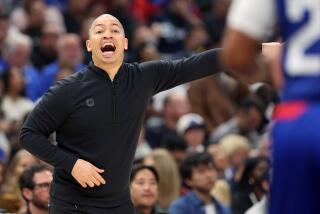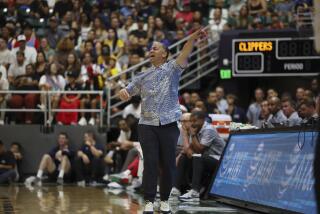The Future Isn’t Now for Clippers
- Share via
When the fourth quarter rolls around, Clipper Coach Alvin Gentry stops trying to be a chef and he turns into a short-order cook.
All of a sudden it’s not about trying to prepare a five-course meal, it’s about getting a quick snack for a victory-starved franchise.
Developing talent is fine and good, but that’s not what keeps you employed in the NBA--especially when you work for a team that runs through coaches like a maid using paper towels.
So at the end of games he tends to go with whatever experienced players he can find. That usually means guys like Sean Rooks, Derek Strong and Eric Piatkowski are in the lineup with the team’s best player, Lamar Odom.
They weren’t part of the Clippers’ marketing campaign, but they’re the ones who are less prone to make rookie mistakes with the game on the line.
As for the youngsters--Darius Miles, Keyon Dooling, Corey Maggette, Quentin Richardson and Michael Olowokandi, who is younger than his years when it comes to basketball experience? They can sit, watch and learn.
“It’s not easy for them,” Gentry said. “I don’t think it’s easy for anybody if you’re not playing. I understand guys’ frustrations.”
“I’ve still got a lot of confidence in our young guys. I do think that it’s a process in this league. Very few guys have been able to step in as rookies. Even the great ones. I try to use Alex English and Clyde Drexler and some of those guys. All of those guys averaged less than 10 points a game the first year.”
When he mentions English and Drexler, it wouldn’t be too surprising if the players said, “Who?” Those guys are a part of ancient history for players born in the 1980s. But if Gentry wants to use more recent examples, he can simply point to Kobe Bryant and Kevin Garnett. They’re considered the leading examples on the “pro” side of the argument about high school players going straight to the NBA, and neither of them were starters when they first got to the league.
The 19-year-old Miles can say the proper words, like a schoolkid reciting the pledge of allegiance, dutifully saying, “You’ve got to take your time. You’ve got to listen and take all the advice you can.”
But within a couple of sentences he gets to talking about the opportunities to get a lot of playing time on a team like the Clippers, and saying, “Hopefully I can be one of the best players in the league very early.”
Miles’ playing time has varied from starting five games to sitting on the bench the entire 48 minutes against the New York Knicks. He got his chance to play in crunch time during a loss to Phoenix, when Gentry stayed with the group (including Dooling) that made a big comeback against the Suns.
After sitting out the first half, Miles played in the fourth quarter and overtime. He made a key jumper and threw down a dunk on a crowd-pleasing alley oop.
He is a great one-on-one defender, but he looked confused and lost his man Shawn Marion away from the ball and Miles left Marion open when he went to help guard a driving Jason Kidd.
So if Miles doesn’t play the next time the Clippers are in a similar situation, he might understand why.
There’s one major risk for Gentry. If he’s going to play to win, then the Clippers have to win. The players need immediate reinforcement to show that what he’s doing has a purpose. Because sitting on the bench for a team that keeps losing can make the grumbling even louder than the stereo in the pregame locker room.
“Winning cures a lot of situations,” Gentry said. “But in our case we’ve still got to continue to look at the big picture. And for us, the big picture is trying to get our franchise and our team to the point where we’re competitive consistently. When I look at our young talent, they’re going to be a part of that. I don’t think we can sacrifice any short-term goals for the long-term ones. I think Quentin, I think Darius, Keyon, Corey, those guys are going to be a part of what we’re trying to do long-range. The thing that I’ve tried to do with them is communicate long-term and let them know that just because things are not going well right at the moment, it doesn’t mean that what we’re trying to get done and what you’re doing is not a success. You’ve got to just keep plugging away. I think the attitude and the environment is what we’re trying to make sure that we change.”
Rooks brings the right attitude. Acquired in a draft-day trade, he has boxed out, knocked down the open jump shot and made his free throws. That’s why he almost always gets minutes at center down the stretch.
How much does experience matter in the last two minutes?
“A lot,” Rooks said. “Our team is very young. And even myself, there’s a lot of things I have to learn about in a situation where you have to shut people down--that’s what it’s about the last five minutes of the game. There’s no time for error. You have to do the best you can to keep the other team from going to their strengths.”
This Clipper team already looks different because it competes the entire game, whereas previous editions sometimes packed it in before halftime.
The next step is actually converting some of these close calls into victories, a move Gentry’s actions signal he is trying to make happen as soon as possible. Even if it means the future has to wait.
*
* TONIGHT: LAKERS vs. CLIPPERS, 7:30, Channel 9.
*
J.A. Adande can be reached at his e-mail address: ja.adande@latimes.com.
More to Read
Go beyond the scoreboard
Get the latest on L.A.'s teams in the daily Sports Report newsletter.
You may occasionally receive promotional content from the Los Angeles Times.






